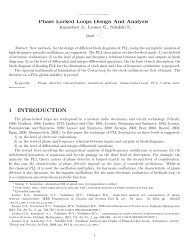Technical Sessions – Monday July 11
Technical Sessions – Monday July 11
Technical Sessions – Monday July 11
Create successful ePaper yourself
Turn your PDF publications into a flip-book with our unique Google optimized e-Paper software.
Friday, 15:15-16:45<br />
� FC-01<br />
Friday, 15:15-16:45<br />
Plenary Hall 3<br />
OR, Energy, and Africa<br />
Stream: OR Applications in Energy<br />
Invited session<br />
Chair: Caston Sigauke, Statistics and Operations Research,<br />
University of Limpopo, Bag X<strong>11</strong>06, Sovenga, 0727, Polokwane,<br />
Limpopo, South Africa, csigauke@gmail.com<br />
1 - Decision Support for Power Generator Maintenance<br />
Scheduling<br />
Jan van Vuuren, Logistics, University of Stellenbosch, Private<br />
Bag X1, Matieland, 7602, Stellenbosch, Western Cape, South<br />
Africa, vuuren@sun.ac.za, Bernard Schlunz<br />
Maintenance of power generating units has to be coordinated carefully within<br />
a power generating utility to ensure that power supply shortfalls do not occur<br />
due to too many units being out of service simultaneously. This maintenance<br />
scheduling problem is considered with scheduling objectives including<br />
cost minimisation and maintaining power generation safety margins (due to<br />
stochastic electricity demand), and with various practical constraints. A case<br />
study is included for the South African power generating utility, Eskom.<br />
2 - Using Metaheuristic Modelling to Further Freight Transport<br />
Energy Management in South Africa<br />
Tanya Visser, Industrial Engineering, Stellenbosch University,<br />
Privaatsak X1, Matieland, 7602, Stellenbosch, South Africa,<br />
tanyav@sun.ac.za<br />
Transportation is a major sustainability engineering concern. The sector consumes<br />
vast amounts of non-renewable energy, expediting resource depletion<br />
and causing environmental harm. Improving sustainability within the sector is<br />
a daunting, highly complex and multi-faceted task. Planning authorities require<br />
decision support to enable decisions cognisant of all the intricacies surrounding<br />
the interaction between transport and energy management. This paper showcases<br />
how a purpose-built metaheuristic model aids in the formulation of freight<br />
transport energy management strategies for South Africa.<br />
3 - Modeling Daily Peak Electricity Load Forecasting in<br />
South Africa using a Multivariate Non-parametric Regression<br />
Approach<br />
Caston Sigauke, Statistics and Operations Research, University<br />
of Limpopo, Bag X<strong>11</strong>06, Sovenga, 0727, Polokwane, Limpopo,<br />
South Africa, csigauke@gmail.com, Delson Chikobvu<br />
Accurate prediction of daily peak load demand is very important for decision<br />
makers in the energy sector. This helps in the determination of consistent and<br />
reliable supply schedules during peak periods. Accurate short term load forecasts<br />
enable effective load shifting between transmission substations, scheduling<br />
of startup times of peak stations, load flow analysis and power system security<br />
studies. A multivariate adaptive regression splines (MARS) modelling<br />
approach towards daily peak electricity load forecasting in South Africa is presented<br />
in this paper for the period 2000 to 2009. MARS is a non-parametric<br />
multivariate regression method which is used in high-dimensional problems<br />
with complex model structures, such as nonlinearities, interactions and missing<br />
data, in a straight forward manner and produces results which may easily be<br />
explained to management. The models developed in this paper consist of components<br />
that represent calendar and meteorological data. The performances of<br />
the models are evaluated by comparing them to a piecewise linear regression<br />
model. The results from the study show that the MARS models achieve better<br />
forecast accuracy.<br />
IFORS 20<strong>11</strong> - Melbourne FC-03<br />
� FC-02<br />
Friday, 15:15-16:45<br />
Meeting Room 101<br />
Scheduling<br />
Stream: Scheduling<br />
Contributed session<br />
Chair: Murari Lal Mittal, Mechanical Engineering Department,<br />
Malaviya National Institute of Technology Jaipur, JLN Marg,<br />
302017, Jaipur, Rajasthan, India, mlmittal.mnit@gmail.com<br />
1 - Aircraft Rotation Problem: Is there a Problem?<br />
Torsten Reiners, University of Hamburg, Institute of Information<br />
Systems, Von-Melle-Park 5, 20146, Hamburg, Germany,<br />
torsten.reiners@gmail.com, Julia Pahl<br />
We survey the literature of airline scheduling regarding not only the isolated aircraft<br />
maintenance rotation problem, but also evaluate to what extend such (integrated)<br />
planning and scheduling problems can be solved to optimality especially<br />
regarding input data of real world problem sizes. In addition, we present<br />
an overview of algorithms and (meta-)heuristics.<br />
2 - Cost Optimization: Case Studies from the Construction<br />
Industry<br />
Miklos Hajdu, Department of Construction Management, Szent<br />
Istvan University Ybl Miklos Faculty, Budapest Thököly út 74,<br />
<strong>11</strong>46, Budapest, Hungary, hajdu.miklos@ybl.szie.hu<br />
Despite the fact that the official history of project management started with a<br />
cost optimization problem (Kelley & Walker 1958), these models have not become<br />
widespread in project management practice. In this paper the algorithms<br />
that operation research offers for project managers for project time-cost tradeoffs<br />
will be summarized. In addition, some case studies from the construction<br />
industry will be discussed, which — in our opinion — prove that cost optimization<br />
ought to be an essential part of project management practice.<br />
3 - A New Weight Varying Scheme for Particle Swarm Optimization<br />
Algorithms<br />
Murari Lal Mittal, Mechanical Engineering Department,<br />
Malaviya National Institute of Technology Jaipur, JLN Marg,<br />
302017, Jaipur, Rajasthan, India, mlmittal.mnit@gmail.com,<br />
Abhinav Mittal<br />
PSO is one of the recent metaheuristics successfully applied to a variety of OR<br />
problems. Inertia weight is an important parameter in PSO algorithms varied<br />
during iterations to effectively explore/exploit the search space. In most of<br />
the existing weight varying schemes it is either increased or decreased during<br />
successive iterations. In this paper we propose a scheme in which weight is<br />
increased form minimum to the maximum in half of the iterations and then decreased<br />
to the minimum in the rest half. The scheme is tested on instances of<br />
the resource constrained multiproject scheduling problem.<br />
� FC-03<br />
Friday, 15:15-16:45<br />
Meeting Room 102<br />
AI and GameTheory<br />
Stream: Contributed Talks<br />
Contributed session<br />
Chair: Janny Leung, Systems Engineering and Engineering<br />
Management Dept, The Chinese University of Hong Kong, Shatin,<br />
New Territories, Hong Kong, jleung@se.cuhk.edu.hk<br />
1 - Feature Extraction and Classification in Pattern Recognition<br />
and their Application in Economy<br />
Pawel Blaszczyk, Institute of Mathematics, University of Silesia,<br />
Bankowa 14 Street, 40-007, Katowice, Poland,<br />
pblaszcz@math.us.edu.pl<br />
125




